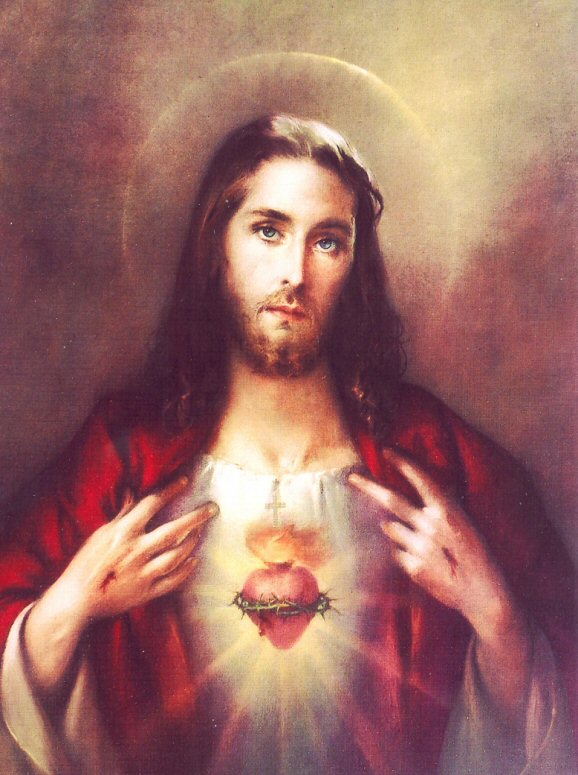
20th Sunday in Ordinary
Time
A Homily - Cycle C - 2006-2007
First Reading - Jeremiah 38: 4-6, 8-10
Responsorial Psalm - Psalm 40:2, 3, 4, 18
Second Reading - Hebrews 12:1-4
Gospel - Luke 12:49-53
Luke writes to explain that
Christ came to save everyone.

Jesus said to his disciples: "I have come to set the earth on fire, and how I wish it were already blazing! There is a baptism with which I must be baptized, and how great is my anguish until it is accomplished! Do you think that I have come to establish peace on the earth? No, I tell you, but rather division. From now on a household of five will be divided, three against two and two against three; a father will be divided against his son and a son against his father, a mother against her daughter and a daughter against her mother, a mother-in-law against her daughter-in-law and a daughter-in-law against her mother-in-law."
"I have come to set the earth on fire, and how I wish it were already blazing. Do you think that I have come to establish peace on earth? No, I tell you, but rather division" (Lk. 12).

Today's excerpt from Luke's Gospel is unsettling. This is not the Jesus with whom we feel comfortable. As one commentator stated it: "The Jesus' statements .... are hardly welcome words to any congregation, we are happier with Jesus as a peacemaker than as a home breaker" (Fr. R.P. Waznak, in Lift Up Your Hearts, pp. 237-8). There is little doubt that Jesus' life and public ministry provoked division. The people of his time had ceased to be faithful children of Yahweh (God). They, not Jesus, had already created division by lapsing into pagan worship and immoral living. Jesus was sent to be redeemer, true! But before there could be reconciliation and peace with God, Jesus had to confront the alienation which already existed. 'Do not think that I have come to establish peace; rather, division.'
The "fire" which Jesus came to enkindle was radically different from the "fire from heaven" "which the prophet Elijah and his own disciples had in mind. their "fire from heaven" was a vindictive, punishing fire meant to kill and consume those who stood in opposition. It is clear from the context of Jesus' compassionate dealings with sinners that the fire which he wished were ablaze in the world was not to be a mortally punishing holocaust. For example: Jesus' dealing with the adulterous woman who was liable to stoning: ("Nor do I condemn you" he said, "Go and sin no more"; and to the paralytic: "Your sins are forgiven. Take up your mat and go home" The "fire" which Jesus desired was an inner sense of conviction and commitment that would change the world, a commitment to the Holy Spirit, the "Spirit of Truth".
It is evident in human life that truth is sometimes hazardous to one's health, or at least to the good opinion which we want others to have of us. The history of Christianity cites many shining examples of persons committed to the truth, persons who were not afraid of speaking the truth to the "powers that be". A few examples:
● In the "Old Testament" Nathan confronted King David's adulterous conduct;
● St. Peter challenged the authority of the scribes and Pharisees, saying: "It is better to obey God than human authority".
● St. Catherine of Siena is noted for her fortitude in telling the truth to a pope who needed to hear it;
● John Fisher and Thomas More, confidants of King Henry VIII, were martyred for refusing to pledge the King loyalty in opposition to the Pontiff;
● Dietrich Bonhoffer, a German theologian, told the Nazis that there was only one true leader, Jesus Christ. The Nazis killed him . . . a martyr to the truth.
It has often been noted that young people, being concerned about what their friends think of them, are strongly influenced by "peer pressure" in moral decision-making. Adolescents are not, however, the only ones who "go along with the crowd", who "maintain the status quo" in evaluating the morality of our contemporary society, whose "lights are (often) contrary" to the lifestyle of Jesus Christ. Many families today must hazard a threatening division regarding the poor moral choices of some family members. Here the words of Jesus sound a clarion warning: ". . . a household will be divided, three against two and two against three" (Lk. 12). It is particularly difficult for parents when their children "run counter to the grain" of their Catholic upbringing. What are caring parents and friends to do in such cases? Tell their loved ones the words of truth that are challenging and corrective, or remain silent and acquiescent? (You know the answer! Try to avoid rationalizing!) In all such cases we need to have recourse to prayer; prayer that we have a discerning heart to make correct judgments; prayer for prudence to act out of concern for the individual more than our own or our family's reputation; prayer for the valor (brave heart) to speak the truth as needed . . and always! always! to "speak the truth with love".
Today's scriptures, while challenging, also encourage us to remain faithful to the truth (maintain personal integrity) and to not compromise our Christian principles. St. Paul said "persevere in running the race . . . while keeping our eyes fixed on Jesus, the leader and perfector of faith" (Heb. 12). Fr. Waznak observed: ". . . our faith is not cheap, not wimpy, not politically correct. Which is why only (the word) "fire" can describe it well."
If you find this
material valuable, consider a tax deductible gift to support this site.
The DaCapo Foundation • 2402 Tricia Ct. • Vienna VA 22181